High-level and fully booked EuroVelo & Cycling Tourism Conference hosted at Lake Balaton
During the three-day event, delegates discussed cycling for a sustainable future, learned from global experiences, exchanged ideas during the networking gatherings, and participated in three exciting technical visits on bicycles around the beautiful Lake Balaton. All delegates returned home with more motivation and inspiration to advance cycle routes and cycling tourism until next year.
Co-organised by the European Cyclists’ Federation (ECF), Active Hungary, Maketusz, VisitBalaton365 and the city of Balatonfüred under the theme “Cycling towards a sustainable future”, the conference programme saw 60 speakers share their insights across four keynote speeches, two plenary sessions and eight parallel sessions, along with 12 exhibitors.
Health and business highlighted during the Welcome reception
On Wednesday, after the annual EuroVelo General Meeting, the conference started with opening speeches by István Bóka, Mayor of Balatonfüred, Máriusz Révész, State Secretary for Active Hungary, Péter Princzinger, CEO of VisitBalaton365 and His Excellency Willem Alexander van Ee, the Ambassador of the Kingdom of the Netherlands to Hungary.
The formal introduction was followed by a keynote discussion on cycling (tourism) for health, reminding the audience of the multiple health and environmental benefits of cycling. “Cycling is a simple and affordable way of being active; just 20 minutes of cycling per day can reduce mortality by 50%”, stated Dr László Babai, President of the Hungarian Lifestyle Medicine Society. Nino Sharashidze, Programme Manager at WHO European Centre for Environment and Health, added that "1€ invested in cycling brings 8€ of health benefits: cycling is one of the most powerful ways towards the sustainable development goals".
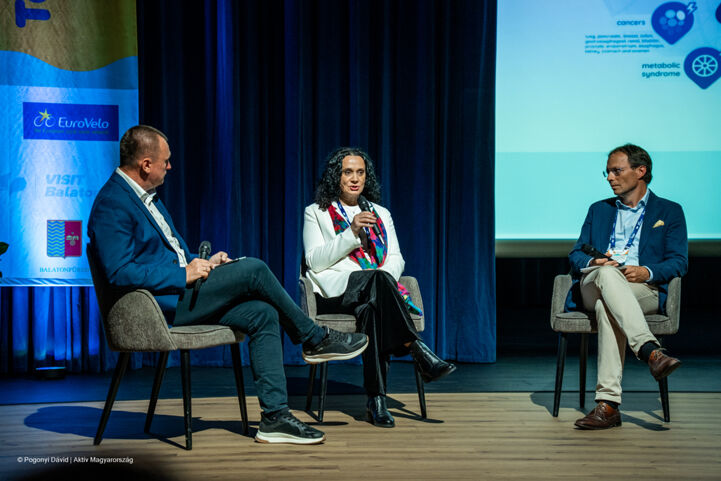
After a scientific demonstration of cycling’s positive effects on health, Agathe Daudibon, EuroVelo and cycling tourism Director at ECF, and Tilman Sobek, managing director at AbsolutGPS, made the business case of cycling tourism. “The potential is there”, so “why not double or triple cycling tourism?” said Sobek, as Daudibon insisted on the need for standardised and updated data in Europe and beyond. "When impact is assessed, the results are impressive: more than +200% economic impact for La Loire à Vélo - EuroVelo 6 between 2010 and 2022 (from 15M to 54M€ a year)" stated Daudibon.
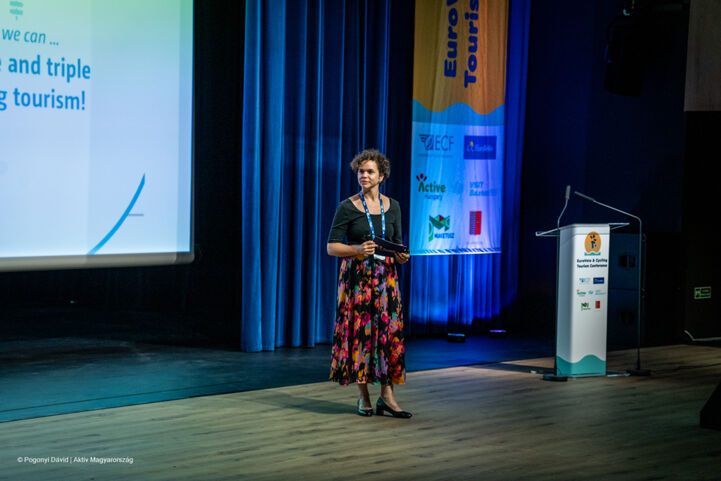
High-level EuroVelo & Cycling Tourism Conference in Hungary
Tibor Navracsics, Minister of Public Administration and Regional Development, was first to open the second day of the Conference. He embodied the political support for cycling in Hungary and shared Balaton’s long tradition of hosting major events. As part of the Active Hungary programme, Máriusz Révész, State Secretary for Active Hungary, presented the initiative promoting active mobility, active tourism and active lifestyle altogether. Cycling summer camps for 5,000 children a year, 180+ pumptracks, 2,000 km of new cycle routes every year, and a dedicated national cycling strategy are just some of the many achievements of the programme.
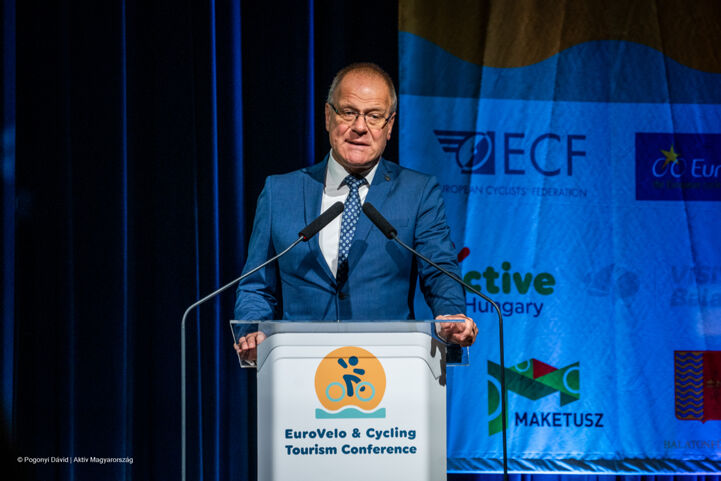
Hungary ranks third for daily cycling in Europe, and tourism accounts for 14% of its GDP, but it still has room for progress in making cycling tourism one of its key sectors.
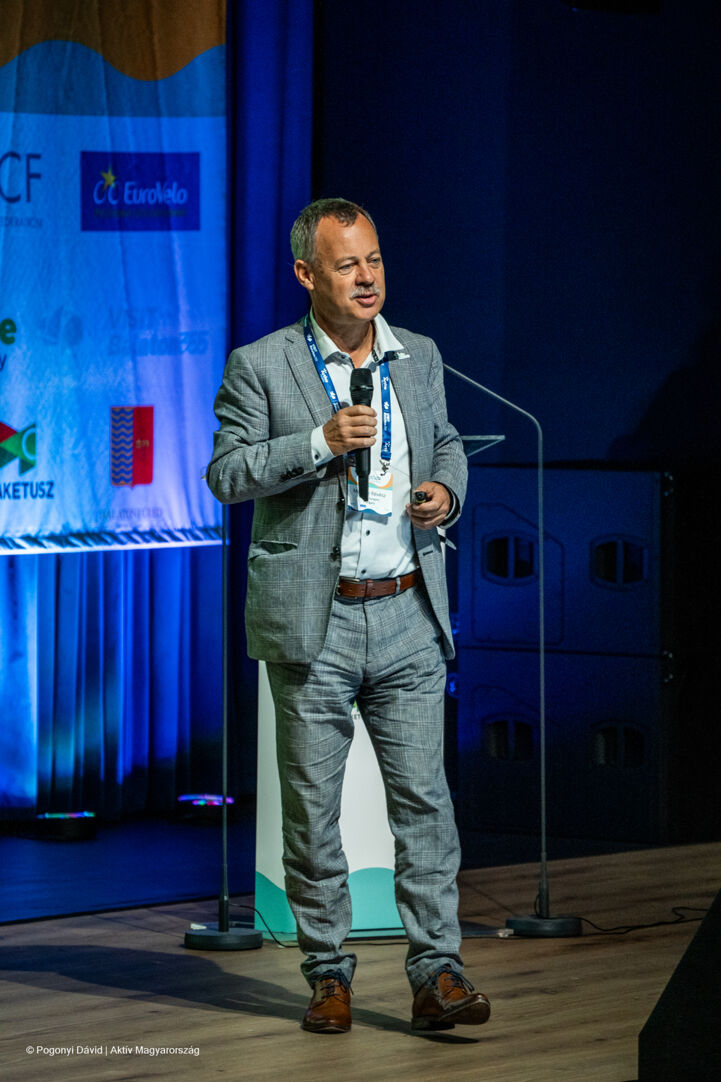
As part of its tourism strategy based on data-driven solutions introduced by Olivér Csendes, CEO of Visit Hungary, the country aims to grow as a top cycling tourism destination. Let’s hope that the EuroVelo & Cycling Tourism Conference legacy will support this ambitious goal!
ECF President Henk Swarttouw highlighted the key values of the event: “Together we can make cycling tourism a central pillar of sustainable tourism, especially with a European Sustainable Tourism Strategy in preparation right now. But to do that, we need more data to demonstrate the width and breadth of the cycling tourism industry. (…) Whether we are talking about EuroVelo or about cycling tourism, we are only as strong as our network. That’s why conferences like this one are so important! To strengthen the bonds that hold our network together.”
Mirkó Petényi, CEO of Active Hungary Development Centre, concluded with inspiring closing remarks: “As the former president of the Hungarian Cycling Club stated: where it is good to cycle, it is good to live". Cycle tourists are curious about the places they visit, they want to experience the destination. On a bike, we are more exposed to the weather, closer to the people we meet, maybe the vulnerability makes cyclists not only tourists demanding services. We need to strengthen the conditions for cycling tourism as a whole, because we all want to live well.”
Past and future achievements: inspirations from plenary sessions
As sustainable tourism is increasingly ingrained in global and European policies, panel speakers reflected on how cycling should be more visible. After the Glasgow Declaration of COP29 or the European Declaration on Cycling, the soon-to-be EU Sustainable tourism strategy should include cycling tourism and make EuroVelo a flagship of Europe’s tourism. Our speakers brought different angles to the discussion and confirmed it: “Cycling tourists are the kind of visitors you want, they want to spend more time, stay in nature, engage with the locals. Cycling tourism responds to the shift from measure to meaning”, said Rebecca Armstrong of The Travel Foundation.
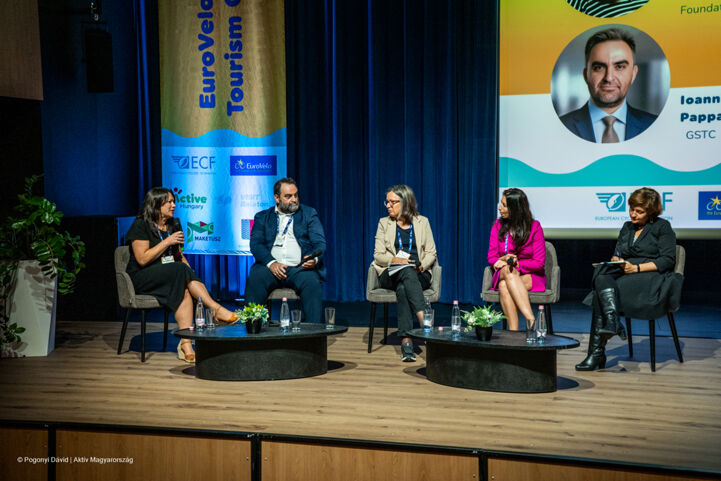
The success story of the Danube cycle route (part of EuroVelo 6) is demonstrating high impact after 30 years of investments. It is now facing conflicts of users on busy sections and unbalanced tourism due to seasonality or extreme weather phenomena. Developing new routes and anticipating risks are ready-to-use solutions, as shown by Balaton Bike 365 and its network of 1,000 km cycle routes from the lake shores to the inland, and full packages of cycling services. On the other side of the spectrum, the Sava Cycle Route is still at an early stage of development but gathering strong cross-border support and is seen as an opportunity within the river’s future sustainable tourism strategy. In the Netherlands, experiencing cycling is an obvious part of a tourism journey, but for a country with 26% of its land below water levels, some cycle routes are made to be flooded when needed. A great example of resilient cycle routes!
Cycling tourism and adventure are also fantastic tools for engaging with communities. Marcell Gangel shared the story of KLND with Spiros Papageorgiou from Cities for Bikes in Greece. His advice: “Build a community behind your initiative.” The power that it brings is higher than what any marketing campaign could do.
Engaging sessions in the morning and in the afternoon
Two rounds of four parallel sessions allowed more in-depth presentations and discussions between speakers and delegates. For the first time this year, workshop formats, limited to 20 participants, included collective work in small groups. The morning sessions covered the topics of funding for cycling projects, inclusive cycling for all ages and physical conditions, engaging locals, service providers, SMES, and digital solutions for cycling tourism. The afternoon sessions were dedicated to public transport and cycling, the challenge of climate change and fragile environments, measuring the impact of cycle routes, and cycling as a solution to overtourism and rural development.
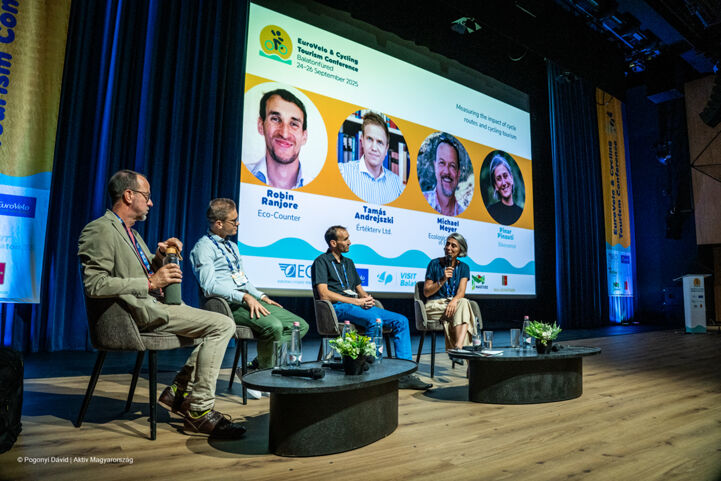
Celebrating best practices: the inaugural EuroVelo & Cycling Tourism Awards
For the first time ever, the 2025 edition of the Conference included the EuroVelo & Cycling Tourism Awards ceremony. The Best cycling tourism initiative, sponsored by SRAM, was awarded to the Amazon of Europe Bike Trail, a cross-border tourism product contributing to nature conservation. The Best cycle route development award highlighted the Western-Pomerania Voivodeship for developing its high-quality cycle route network using EuroVelo as a backbone. More in this article.
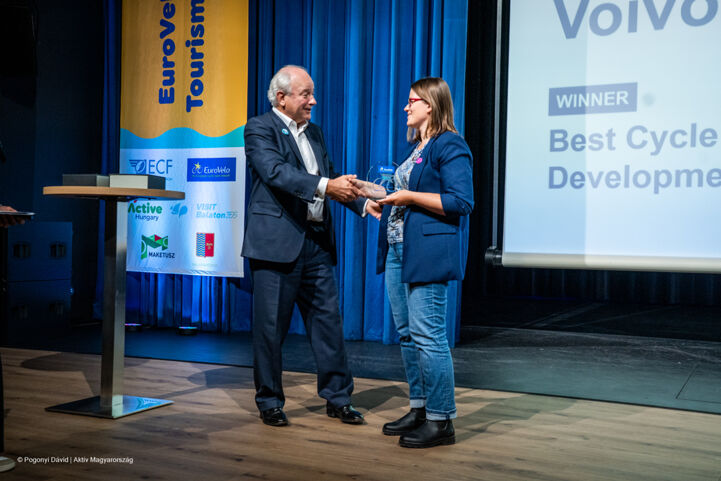
Hungarian hospitality and gastronomy for EuroVelo Conference’s delegates
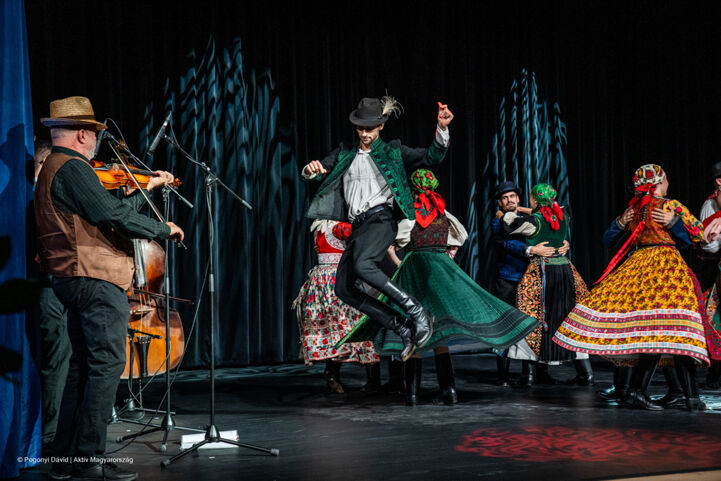
Throughout the Conference, participants experienced Hungarian hospitality with delicious local wine and cheese, the comfort of the very modern Balatonfüred Conference Centre and entertaining folklore dances, an acrobatic bike show and local music bands.
The Master of Ceremony, journalist Zoltán Szujó, also contributed to a smooth Conference, sharing Hungarian insights from a keen cyclist and motorsport specialist.
Experience of Lake Balaton’s cycling offers finishing with lunch on the water
Friday started early with three different technical visits: one focusing on EuroVelo 14 along the northern shore of Lake Balaton, the second addressing overcrowded cycle routes and especially conflicts between cyclists and pedestrians and the last one exploring the region's mountain bicycle offerings.
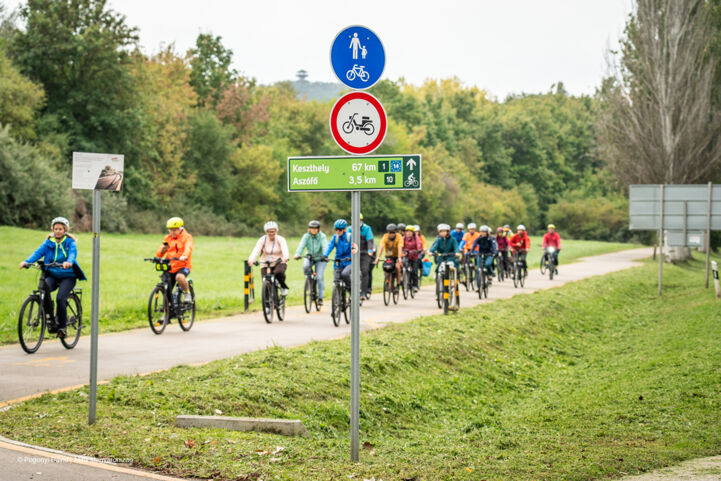
The conference ended with a special highlight: after concluding the technical visits, all groups convened on a ferry back to Balatonfüred for a delicious lunch with scenic views of the Tihany peninsula.
See you at next year’s EuroVelo and cycling tourism conference in Utrecht, the Netherlands, from 30 September to 2 October 2026.
Cities and regions interested in hosting the 2027 edition can apply until 30 January 2026. More details on the bidding process are available here.
Check the detailed programme of the 2025 conference and the full list of speakers here.
Author: Agathe Daudibon